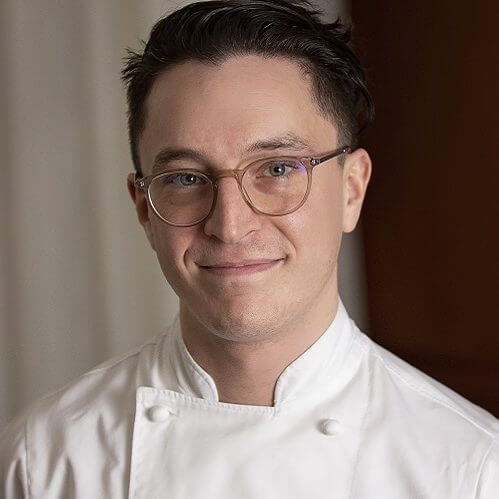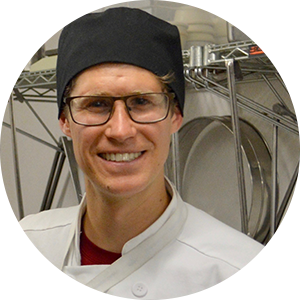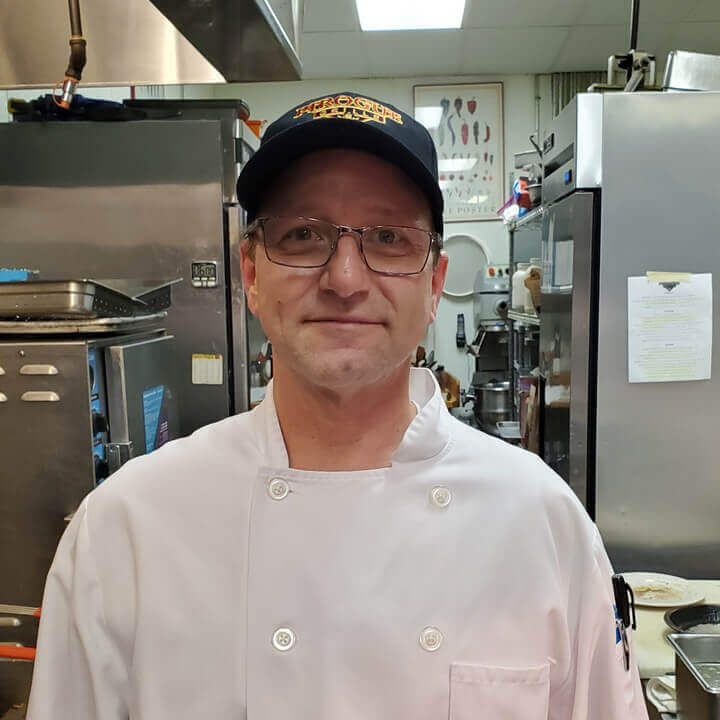Listen to This Article:
Whether you’re a high school student debating your next move… an established adult considering a career change… or an experienced cook looking to advance your skills or start your own business… Attending culinary school is a big decision that involves many considerations.
What are the pros? What are the cons? Is a culinary degree the right choice for you?
Culinary school may open up new career opportunities, expose students to mentors and an extensive network of culinarians, and can teach useful skills and techniques. Plus, if you love to experiment in the kitchen, it can also be a lot of fun!
But it’s not for everyone. The guidance that comes with culinary school also requires an investment — an investment of your time, effort, financial resources, and months or years of hard work. If you’re on the fence, this list of culinary school pros and cons may help you decide to take the next steps, or pursue your career path another way.
Culinary School Pros and Cons
The Pros of Culinary School
There are myriad benefits to earning a culinary degree or diploma, from mentorship to career opportunities. Here are a few to consider while you weigh your options.
Culinary School Can Open Up More Career Opportunities
A culinary school education is not a requirement in order to have a career in food or a professional kitchen. But it can certainly help.
After all, hiring managers generally look for staff members they can spend the least amount of time, energy, and financial resources for training on the job. By bringing an established skillset from culinary school – and indicating that you have the wherewithal to work hard and earn a degree – you can be a big draw for hiring chefs.
Culinary school can also help prove your dedication to food as a career, not just a job. In an industry where turnover can be high, chefs may prefer a candidate who is committed to a career in food, rather than one who simply sees the position as a temporary job.
If you don’t plan to work in a professional kitchen, culinary school still has the potential to improve career prospects. If you were hiring a food critic, wouldn’t you prefer one who has the culinary knowledge to back up their writing skills?
Omni Hotels & Resorts Executive Chef Josh Hasho says culinary school is a gold star on a resume.
Study with a Variety of Chef Instructors in Culinary School
In culinary school, students have the opportunity to learn from and interact with multiple Chef Instructors throughout their programs. These industry professionals include Certified Executive Chefs®, James Beard Award-winners, chefs who have worked in Michelin Star restaurants, and restaurant owners. This means exposure to a variety of worldviews, techniques, and culinary styles.
Access to these experienced culinary experts also may provide opportunities for mentorship as well as ongoing networking. Some graduates even build long-term relationships with their Chef Instructors, and personally stay in touch throughout their careers for advice. From tips on working your way up in a busy kitchen to embarking on the journey of entrepreneurship, these passionate teachers are eager to share their knowledge after having paved the way for future generations of culinarians.
With their diverse backgrounds, our large group of Chef Instructors can give students a more well-rounded culinary education than if they simply learned from one executive chef or mentor on the job.
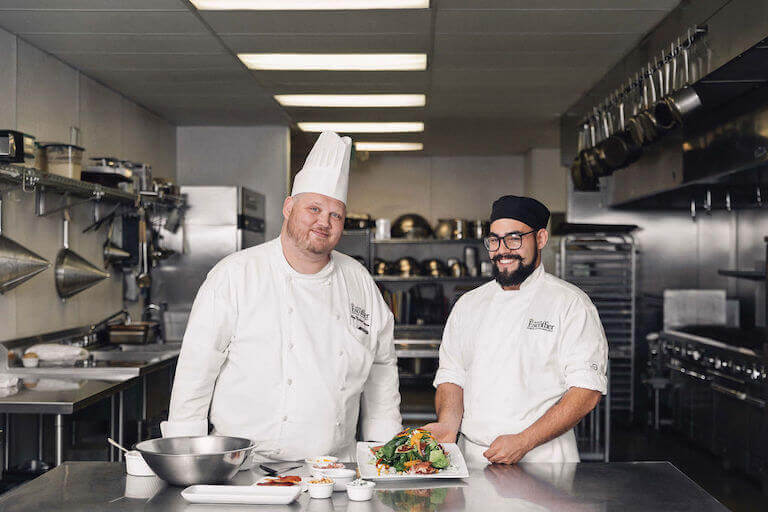
Access Networking Opportunities as a Student and Alumnus
In culinary school, your networking opportunities aren’t limited to your Chef Instructors. There’s an entire network in your peers as well.
Students may meet dozens of like-minded students while they study. These fellow students may be at various points in their own culinary careers, from beginners to experienced cooks and chefs looking to improve their skills. These students can serve as future resources for job opportunities, moral support, and further education.
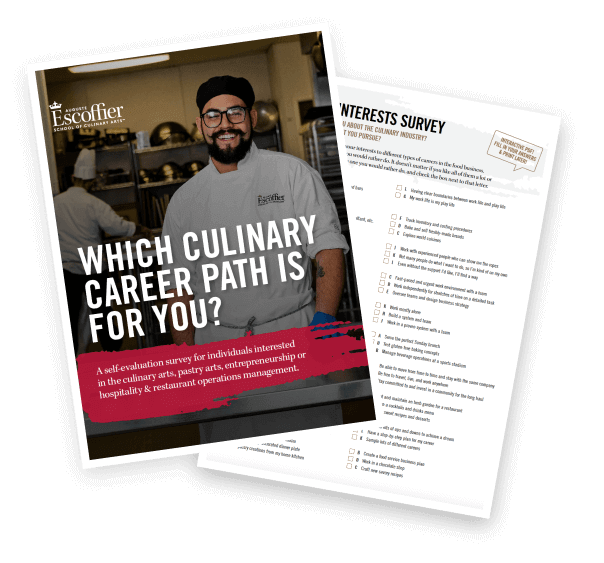
Take the Culinary Career Survey
We’ve compiled a checklist of all of the essential questions into one handy tool: career options, culinary interest surveys, educational opportunities, and more.
Escoffier graduates also get access to the Escoffier Alumni Association, so they can expand their network to former graduates that may have advanced further in their careers.
All Escoffier students also complete at least one hands-on industry externship during their programs. This real-world experience has the benefit of giving students a position to put on their resumes, and provides yet another networking opportunity. Co-workers and supervisors at your externship may know about new job openings and opportunities in the future!
A large network can also help future restaurant or food truck owners to find qualified candidates when they’re in a position to do the hiring.
Gain Exposure to Advanced Techniques and Cuisines From Around The World
When working in a professional kitchen, your job is to execute the prep or cooking necessary to serve that predetermined menu to customers. While you may learn those 10 or 20 dishes quickly, your opportunity to learn more varied techniques can be limited.
A good culinary school curriculum is one that builds on itself, scaffolding your knowledge day by day. Since earning a culinary degree isn’t tied to any specific menu, students get to explore a wider variety of skills, from basic knife skills and sanitation methods to more complex world cuisines and advanced cooking techniques — all in 30 to 60 weeks!
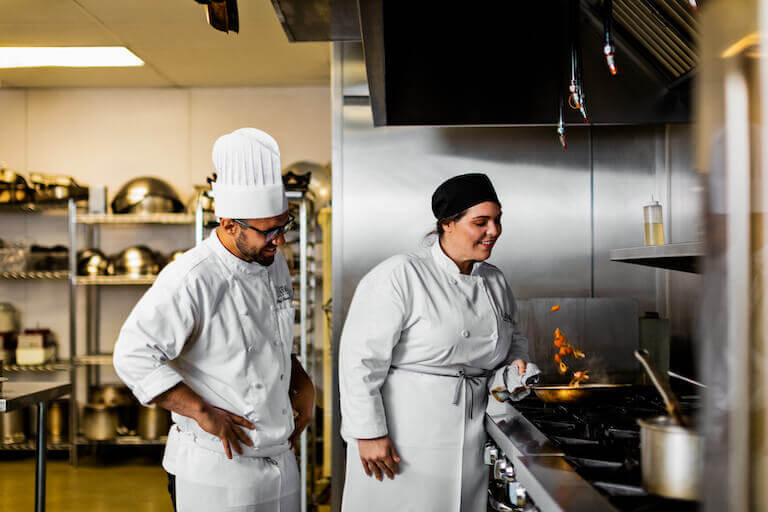
Develop Lifelong Good Habits in the Kitchen
Speed is vital in a professional kitchen. This means that some cooks may learn to take shortcuts to move more quickly.
These shortcuts could include rushing through inventory, estimating weights instead of using a scale, or turning up the temperature on the oven. And the result can be wasted product, sub-standard food, or a sloppy workstation.
In culinary school, students are expected to develop good habits and discipline from the beginning. They must arrive on time, in a clean uniform, ready to work. Organization and cleanliness are paramount in a successful cook, which is why starting with good habits is so important.
Even for students who have already spent several years working in professional kitchens, culinary school can help them to refresh their habits, get back to the fundamentals, and become more efficient and effective overall.
The Cons of Culinary School
While there aren’t too many “cons” to attending culinary school, there may be some challenges. And depending where you are in your career, it may not be the right time. Here are some challenges you should consider before applying.
Culinary School Requires a Time Commitment
Education takes time. Getting your education may delay your ability to make big changes, like getting a new job, taking a vacation, or starting a new business.
Still, unlike a 4-year degree program, Escoffier students can earn their culinary diploma in just 30 weeks, and their culinary degree in as little as 60 weeks. If you don’t go to culinary school, those 30 or 60 weeks will still fly by… But at the end, instead of having a culinary degree or diploma in hand, you might still be operating with the same set of culinary skills you had at the beginning.
Culinary School Requires a Financial Investment
Except for the rare case where a student finds ample scholarships that cover 100% of the costs, culinary school is not free. There is still a financial investment required to attend.
Fortunately, financial aid is available to Escoffier students who apply and qualify to help fund their in-person or online culinary school programs.
Culinary school students may also see a financial return on their investment. Some employers might be willing to pay more for culinary school graduates, so they can benefit from that formal training in their kitchens.
It Might Be a Challenge to Juggle Work, Family, and School Responsibilities
Culinary school students often have to work while they’re in school to continue paying the bills. And some are later-in-life students, who also have families to look after. This can make attending school for hours per day a bit of a challenge.
Escoffier’s online programs can help meet this unique set of circumstances. Students can complete these programs on their schedule, as long as they meet the required course deadlines. Watch instructional videos and practice those skills at night after the kids are asleep, or even early in the morning before work.
Escoffier student Katie Sualog does just that – balances family life, career, and education. In fact, she started her degree program online before transferring to the Escoffier Austin campus. A mother of two, she also runs a home-based bakery while she’s earning her degree.
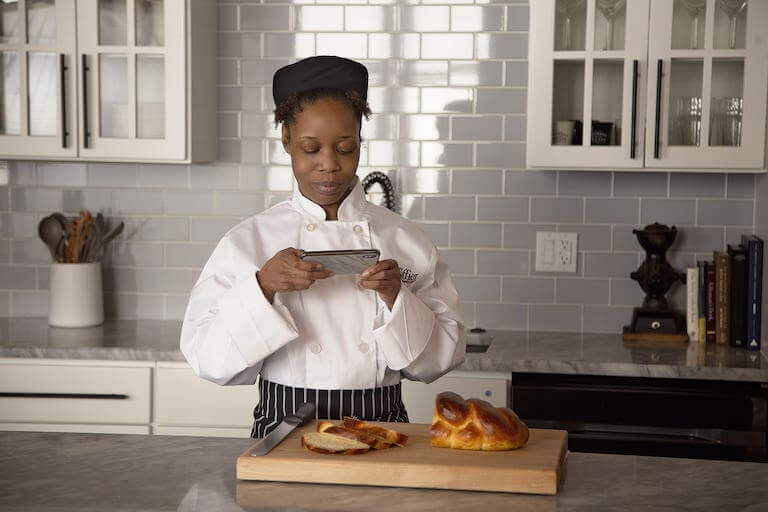
Plus, each Escoffier student is assigned a Success Coach to help them if they run into trouble or are struggling with any part of their programs. These motivators and problem solvers are in your corner to help you right through to graduation day.
So, Who Is Culinary School Right For?
Put it all together… and what does it mean? Culinary school may be the right path for anyone who wants a deeper understanding of cooking and food. It’s an excellent option for future cooks who dream of a culinary career — which could mean working in a professional kitchen or opening a restaurant or food truck, or working in an alternative career as a food photographer, food writer, chef consultant, recipe developer, and more.
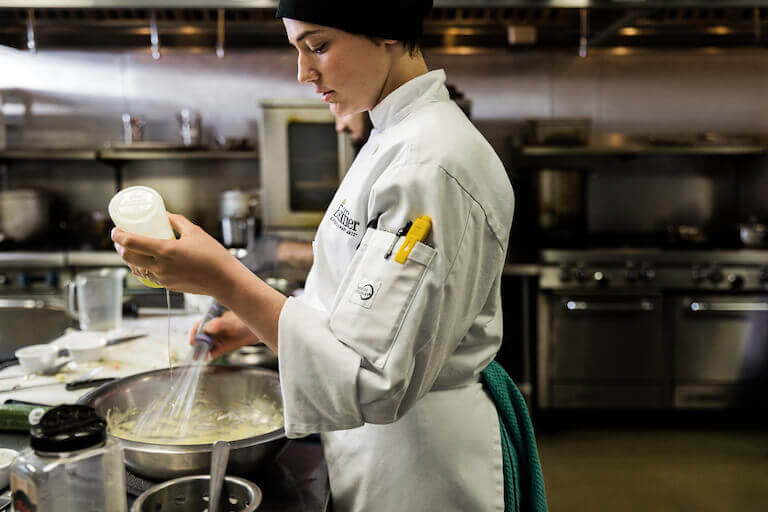
It’s also for people who see education as an investment in themselves and in their futures, and who understand that there is great potential to see both financial and personal returns on that investment.
If that sounds like you, culinary school just might be the right path. Reach out to us today to learn more about how you can start!
To get a little more insight into the value of culinary education, try these articles next:
- How Much Does Culinary School Cost and How Can You Pay For It?
- College Not For You? Try Culinary School
- Why Older Students Should Consider Culinary School
This article was originally published on May 4, 2021, and has since been updated.
*Information may not reflect every student’s experience. Results and outcomes may be based on several factors, such as geographical region or previous experience.

